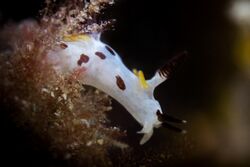Biology:Trapania norakhalafae
| Trapania norakhalafae | |
|---|---|

| |
| The nudibranch Trapania norakhalafae, Dibba Sea, Gulf of Oman | |
| Scientific classification | |
| Kingdom: | |
| Phylum: | |
| Class: | Gastropoda
|
| (unranked): | clade Heterobranchia
clade Euthyneura clade Nudipleura clade Nudibranchia clade Euctenidiacea clade Doridacea |
| Superfamily: | |
| Family: | |
| Genus: | |
| Species: | T. norakhalafae
|
| Binomial name | |
| Trapania norakhalafae Khalaf, 2017
| |
Trapania norakhalafae is a species of dorid nudibranch in the family Goniodorididae. It was identified as a species new to science in 2017, and was named in honour of the discoverer's daughter, Nora Khalaf.[1][2]
Description
Trapania norakhalafae grows up to 6mm in length and is white with dark brown marking on its upper (dorsal) surface. The pattern of markings vary between individuals. Two pairs of yellow, tentacle-like appendages arise from the basal area of each rhinophore and from the base of the creature's gills. The rhinophores are white, like the main body, but have dark brown distal parts.[1]
Habitat
The species was found in waters at depths between 3 and 16 metres, where it lives within coral reefs and mixed sandy flats where they are reported as feeding on small, sessile Enteroprocts that live on corals and sponges.[1]
Distribution
The species was first described from the Gulf of Oman in 2017. It is distributed from the Red Sea through the Arabian Sea and the Indo-Pacific region.[1]
References
- ↑ Jump up to: 1.0 1.1 1.2 1.3 Khalaf-Sakerfalke von-Jaffa, Norman A.B.A.T.M.A.M.; Khalaf, Ola M.E.K. (September 2017). "Trapania norakhalafae Khalaf, 2017: A New Dorid Nudibranch Sea Slug Species from the Dibba Sea, East Coast of the United Arab Emirates, Gulf of Oman, Arabian Sea, Indian Ocean.". Gazelle: The Palestinian Biological Bulletin (153): 7–30. ISSN 0178-6288. https://issuu.com/dr-normanalibassamkhalaf/docs/trapania_norakhalafae_khalaf_2017_n. Retrieved 20 October 2017.
- ↑ "Trapania norakhalafae Khalaf & Khalaf, 2017". http://zoobank.org/NomenclaturalActs/5AED4D56-A22C-4F7E-840D-04A16FF0563D. Retrieved 20 October 2017.
External links
Wikidata ☰ Q42293592 entry

